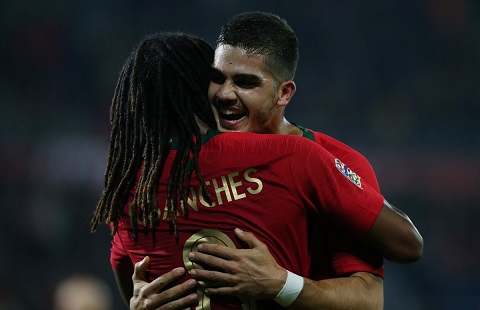 As the transfer window shuts all around Europe, Portuguese footballers have again made a big splash this summer, none more so than the move of João Félix from Benfica to Atlético Madrid for a massive €126 million fee.
As the transfer window shuts all around Europe, Portuguese footballers have again made a big splash this summer, none more so than the move of João Félix from Benfica to Atlético Madrid for a massive €126 million fee.
For years now Europe’s biggest clubs have turned to the Primeira Liga to inject a splash of that special Portuguese flair, and the players in question have jumped at the chance to showcase their talents on a bigger stage – not to mention giving their bank accounts a boost – only for it to turn out a case of “careful what you wish for” for some.
Several Portuguese players, seemingly on the brink of global stardom, have struggled to replicate abroad the form that made them look like world beaters in their home country. PortuGOAL looks at five players who left these shores with the world at their feet, only to get lost in the wilderness and severely curtail their career prospects.
Renato Sanches
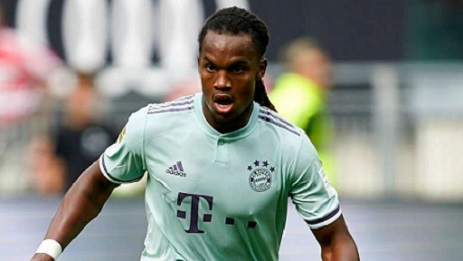 When Portugal finally won their first piece of international silverware at Euro 2016, Renato Sanches had the world at his feet. On Benfica’s books since 2006, Renato spent his youth and his teens as part of the Lisbon club’s academy graduating seamlessly into the first team squad at the beginning of the 2015/16 season, settling into the side in October of 2015. What followed were energetic, dynamic displays by then 18-year-old earning plaudits across Europe. By the end of the season Benfica had won both the Primeira Liga, operating a sensational comeback to overhaul Jorge Jesus’ Sporting, and the Taça da Liga.
When Portugal finally won their first piece of international silverware at Euro 2016, Renato Sanches had the world at his feet. On Benfica’s books since 2006, Renato spent his youth and his teens as part of the Lisbon club’s academy graduating seamlessly into the first team squad at the beginning of the 2015/16 season, settling into the side in October of 2015. What followed were energetic, dynamic displays by then 18-year-old earning plaudits across Europe. By the end of the season Benfica had won both the Primeira Liga, operating a sensational comeback to overhaul Jorge Jesus’ Sporting, and the Taça da Liga.
His form carried him all the way into the Portugal national team just in time for the Euros in 2016, taking the place of the injured Bernardo Silva, making him the youngest Portuguese player to ever represent Portugal at an international tournament, breaking Cristiano Ronaldo’s record at Euro 2004. After missing only the second group stage game vs Austria he went on to play a crucial part of Portugal’s triumph. Sanches scored a stunning strike from outside the box against Poland and gave Portugal a forceful defence-to-attack transitional energy in midfield as they became European champions; he won the Young Player of the Tournament Award and that year also picked up the European Golden Boy Award.
Joining Bayern Munich that summer seemed the next step in his meteoric rise, with the German giants widely praised for winning the race for the signature of Europe’s next big thing – Bayern actually signed Sanches before Euro 2016.
But the fresh season was when it all started to unravel for Renato. In his first year at Bayern he made 25 appearances in all competitions, mostly from the bench, without a single goal or assist. “Honestly, I have to say my first season here wasn’t particularly good,” said Sanches at the end of 2016/17. “But I won’t let it get me down and I’m certain the coming season will be better for me. Personally speaking, I expected more in my first year, but next year will definitely be better.”
It wasn’t. What followed was a disastrous loan switch to relegation-fighting Swansea, a lowlight being when he passed to an advertising board before being substituted at half time during a match against Chelsea. Two hamstring injuries followed, and he did not play a single minute after January, going back to Bayern Munich arguably a less confident player.
Despite encouraging words came from new Bayern manager Niko Kovač, who promised consistent game time, Renato found himself riding the bench again. Even a man-of-the-match display and a goal against Benfica back at the Estádio da Luz in the Champions League failed to improve matters.
After more assurances from Kovač at the start of the season that he would get more playing time, being brought on for the last five minutes of Bayern’s opening league match proved the straw that broke the camel’s back. A lifeline was thrown as French club Lille came in for Sanches, and he did not hesitate to join the club who finished second behind PSG last season and will play in the Champions League. At 22 years old, Renato still has time to turn his career around and a fresh move like this could be exactly what he needs.
João Mario
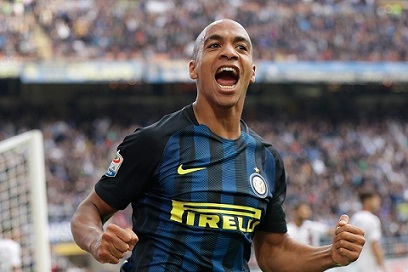 Like Renato Sanches, João Mario got his big move in the summer of 2016 after a fabulous club season and an excellent showing at Portugal’s triumphant Euro 2016 including a sublime assist for Cristiano Ronaldo’s first goal vs Hungary. The stylish midfielder transferred from Sporting to Inter Milan after two years for the Lions in which the potential of the player was there for all to see.
Like Renato Sanches, João Mario got his big move in the summer of 2016 after a fabulous club season and an excellent showing at Portugal’s triumphant Euro 2016 including a sublime assist for Cristiano Ronaldo’s first goal vs Hungary. The stylish midfielder transferred from Sporting to Inter Milan after two years for the Lions in which the potential of the player was there for all to see.
30 Serie A appearances with 3 goals and 5 assists seemed like a positive start to life in Italy but the decline in playing time started to increase. Mario began making noise about the lack of playing time at the club, and an encouraging loan to West Ham in January 2018 led many to believe that by the time he went back to Inter Milan he would be ready to crack the starting XI. However, during the summer of 2018 Mario told Gazzetta Dello Sport:
“I will not go back to Inter, the truth is that I don’t like Serie A. I don’t want to try again, I don’t have the necessary motivation, it’s an experience that’s over, no doubt. I’m not angry, I’m taking stock of the year and a half I spent in Milan. The idea is clear: I will not go back.
“I’m just being honest, there’s no fire inside me to rekindle with the Nerazzurri. When I arrived, I was fired-up for a project which seemed to be taking off, too bad it didn’t go that way.
“Who is to blame? Everyone and no-one. Inter and the environment there, probably all of Italian football, is not for me. It would be pointless to go back after the World Cup, even if I have a contract until 2021.
“I hope we can find a solution as soon as possible, maybe even before the end of the World Cup. In football, as in life, one must be honest in understanding when things end. And with Inter it’s over.”
Despite going back to Inter for another year, it was clear that his heart was not in it and that the coaching staff deemed him surplus to requirements. A loan move to Russian side Lokomotiv Moscow ahead of the 2019/20 season may be the lifeline the 26-year-old needs in order revitalise his career. Mário is all too aware of this saying: “Playing for Lokomotiv is far more interesting than not playing with Inter”.
Nélson Oliveira
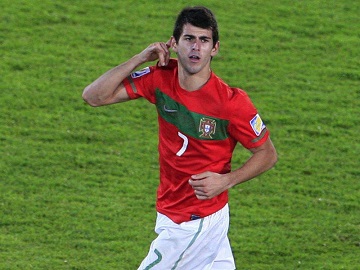 Nine different clubs in the last 10 years does not paint a pretty picture of a player who at the beginning of the decade was touted as the answer to Portugal’s long-standing and well documented striker problems following Pauleta’s retirement from international football.
Nine different clubs in the last 10 years does not paint a pretty picture of a player who at the beginning of the decade was touted as the answer to Portugal’s long-standing and well documented striker problems following Pauleta’s retirement from international football.
Scoring an important champions league goal vs Zenit for Benfica seemed to imply that this is indeed a player who will only continue to grow with more playing time. Unfortunately, this is where the story changes. Despite playing at Euro 2012 with a few decent cameo appearances, Benfica decided to loan him to Deportivo La Coruña where he scored 4 goals in 30 appearances.
Although the goals never completely dried up, loans to Rennes, Swansea and Nottingham Forest were not deemed successes. Things began to pick up when Nélson signed for Championship side Norwich City. In his first season he scored 12 goals and many began to speculate that now he was proving himself abroad we could expect bigger and better things for Nélson. A fallout with manager Daniel Farke led to Nélson being dropped from the squad with Farke pulling no punches when commenting on the matter:
“I was not happy with him over the past week. I like Nélson a lot. I have supported him in this tough period. In 13 games he has scored one goal from 40 metres at Wolves and John Ruddy helped him with a big mistake.
“Even my centre-back Timm Klose in this period could score twice and have an assist. Nélson knows he is not on a good run but I have backed him and supported him.”
Nélson was once again loaned out, this time to fellow championship side Reading although no permanent deal was put in place. Now 28, Nélson finds himself in Greece having signed for AEK Athens in the summer of 2019. The chances of Nélson getting back into the Portugal set up are slim but arguably we never truly saw the player he could have been.
André Silva
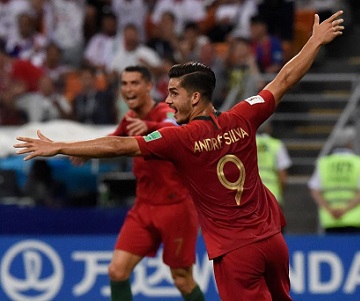 The same hype surrounding Nélson Oliveira could be transposed to André Silva. Coming through the youth ranks at Porto he finished his first full season (2016/17) in style with 21 goals across all competitions in 44 appearances.
The same hype surrounding Nélson Oliveira could be transposed to André Silva. Coming through the youth ranks at Porto he finished his first full season (2016/17) in style with 21 goals across all competitions in 44 appearances.
Whereas with Nélson Oliveira pundits assumed that he would grow into a lethal striker, André Silva was already making a case for making Portugal’s No. 9 shirt his own right away. His form for the national team mirrored his exploits for the club: 18 caps and 11 goals across 2016/17, and a seemingly magical chemistry with Cristiano Ronaldo.
AC Milan snapped up the striker, giving him the No. 9 shirt, and his career abroad got off to the perfect start with a hat-trick in the Europa League group stage, only for the season to tail off and it was an immensely disappointing end of the campaign for Silva. Milan coach Gennaro Gattuso was not impressed with Silva either, stating: “André knows that he has to wake up. It’s been a year and what he did is not enough.”
A loan to Sevilla could not have started any better with Silva scoring a hat-trick against Rayo Vallecano on his La Liga debut followed by three goals against Real Madrid. But mirroring the situation in Milan, the goals dried up and whilst initially the president seemed keen in keeping the player permanently in Spain, by the time the season was wrapping up in May coach Joaquin Caparros made strong remarks in regards to Silva’s potential call-up to the national team.
“We are not stupid. André Silva will not play this weekend and it is a case to be talked about seriously. Let’s talk about a guy who did very well in the beginning but then disappeared, especially in the last two months. I ask Portugal, for football’s sake, not to call him to the Nations League - it would be an insult to football.”
With one goal in all of 2019 for Sevilla, Silva went back to Milan with question marks as to where his future lies long term, and on transfer deadline day a two-year loan to Eintracht Frankfurt was agreed, where he will team up with former Porto team-mate and fellow Portuguese Gonçalo Paciência. Still only 23, André Silva, like Renato Sanches and João Mário above, still has time to kick-start his career.
Rui Fonte
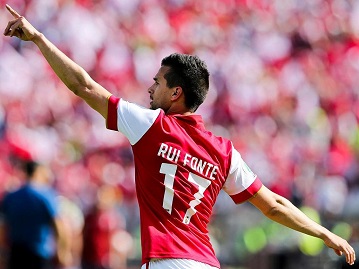 Although not as hyped as all previous entries, Rui Fonte has played for 11 different clubs since 2009 and is currently back in Portugal playing for Braga. One glance at his Wikipedia page shows many clubs clearly wanted his services but with very brief stays in each one of them.
Although not as hyped as all previous entries, Rui Fonte has played for 11 different clubs since 2009 and is currently back in Portugal playing for Braga. One glance at his Wikipedia page shows many clubs clearly wanted his services but with very brief stays in each one of them.
On Sporting’s books as a youth player, he made the move to Arsenal in 2008, playing mainly for the reserve side and making just a handful of first-team appearances for the Gunners.
An intelligent player who can play either as a forward or as a right-sided winger he was initially loaned out to Crystal Palace, joining brother José. Following loans to Vitoria Setúbal, Espanyol, Benfica and Belenenses, he found his feet playing for Sporting Braga: 13 goals in 33 appearances led to speculation of call to the national team and perhaps an exit to a club abroad in order to continue the form displayed for the Arsenalistas. He went back to England, signing for Fulham in the Championship.
Following another below average spell he was loaned out to Lille, once again joining his brother José. Yet another season with minor impact ensued (1 goal for the 2018/19 season). At 29 his prime years may have passed him by, but at least he is back at the club where he had his most successful period.
By Miguel de Castro (twitter: @MiggyDeCastro)
Are there any players which have flattered to deceive abroad that come to mind that we have missed? Let us know in the comments.

